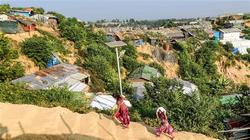 The novel coronavirus has infected over one million people and killed over 50,000 worldwide.
The novel coronavirus has infected over one million people and killed over 50,000 worldwide. RNA - The virus has hit the US the hardest, killing thousands. US stockpiles of emergency medical gear are almost depleted as hospitals need millions more masks and protective equipment.
This is while Italy, Germany and many other countries in the West are prolonging their lockdowns to stop the spread of virus.
These are supposed to be modern and developed countries, and they have all failed to contain the virus with all that money and advanced equipment. Imagine those Rohingya Muslim refugees who have no country and no place to seek treatment.
There are at least one million Rohingya refugees, half of whom are children. They have been sheltering in camps in Cox’s Bazar since August 2017, when they were forced to flee their homes in the face of horrific violence.
For almost three years, Rohingya refugees have tried to go home and resume normal life. They want their children to go to school and for families separated by the conflict to be reunited. So far, international attempts to hold Myanmar accountable for crimes against the Rohingya and improve conditions in Rakhine state have failed. In short, it will be years until the Rohingya see justice, if at all.
As global life grinds to a halt in a bid to contain the coronavirus, the world must remember that for the Rohingya refugees in Bangladesh, their lives have already been in limbo for years; it is their status quo, and it will not end with the containment of coronavirus.
If there is one lesson for refugees that the world must take away from this crisis - it must be that refugee camps, and a life in limbo, should never be considered an acceptable long-term solution. The United Nations must challenge perceptions that because the Rohingya escaped Myanmar with their lives, they are safe.
The coronavirus is a warning that there is not endless time to resolve the issues in Myanmar that would finally allow the Rohingya to return home. While the people and government of Bangladesh have generously continued to shelter the Rohingya for years, life in the camps is not safe.
The world is now witnessing the impact that coronavirus is having in communities that can exercise social distancing, wash hands and have access to strong healthcare systems, yet this virus has still brought them to their knees. In the densely packed camps of Cox’s Bazar, options of social distancing or self-isolation are remote, with many refugees living in cramped conditions in makeshift shelters.
The government of Bangladesh and humanitarian agencies have sprung into action. Rohingya refugees are included in the national plan to respond to COVID-19, food distribution agencies are developing new ways to distribute food that minimizes close person to person contact. Rohingya volunteers are mobilizing throughout the camps to spread hygiene that will protect their families and loved ones.
This is a necessary step to ensure they are reducing the chances of transmission and minimizing the impact of this disease on the Rohingya community, but this is not enough.
The United Nations and aid agencies should work with Bangladesh and Rohingya refugees to protect them from COVID-19. The fact remains, Rohingya children should not be living in these camps. They should not have to fight a global pandemic with the bare minimum needed to survive. They should be at home.
At a time when there are more displaced people around the world than ever before - the coronavirus has exposed how global systems fail the most vulnerable. The global mechanisms for accountability and the protection of human rights have failed the Rohingya so far - it is absolutely essential that the world does not fail them again.
This is a global pandemic and the virus is now hitting the most vulnerable communities. The world must come together. Only a global response will stop the spread of the virus in the camps.
This means the international community must step up to offer medical support, testing kits, share data and provide much needed funding to support the response. The world community should also end the Rohingya refugee crisis. These desperate people shouldn’t end up paying the heaviest price.
*****
112/940